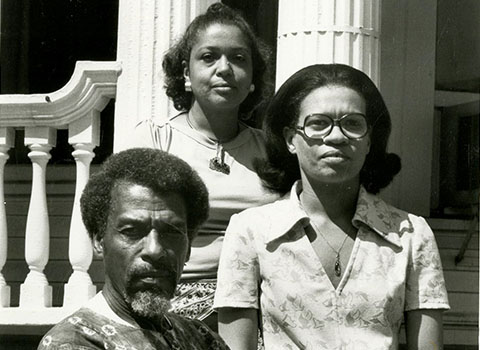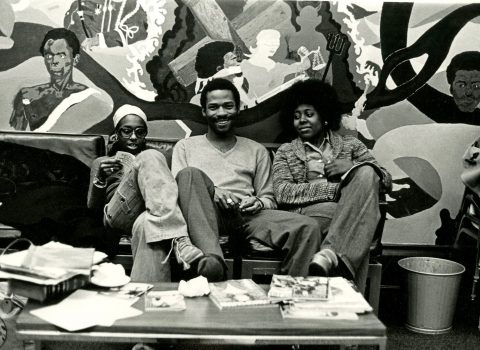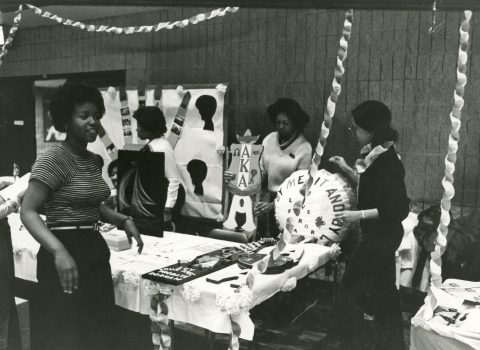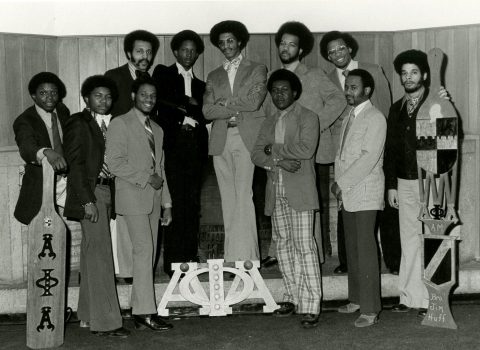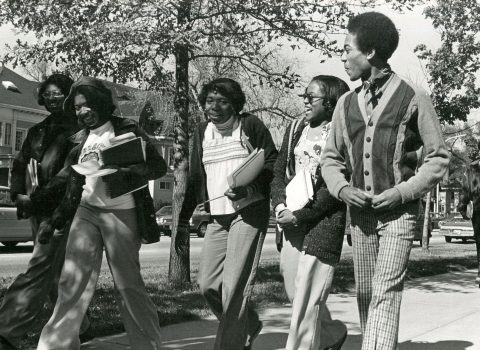Results and Responses
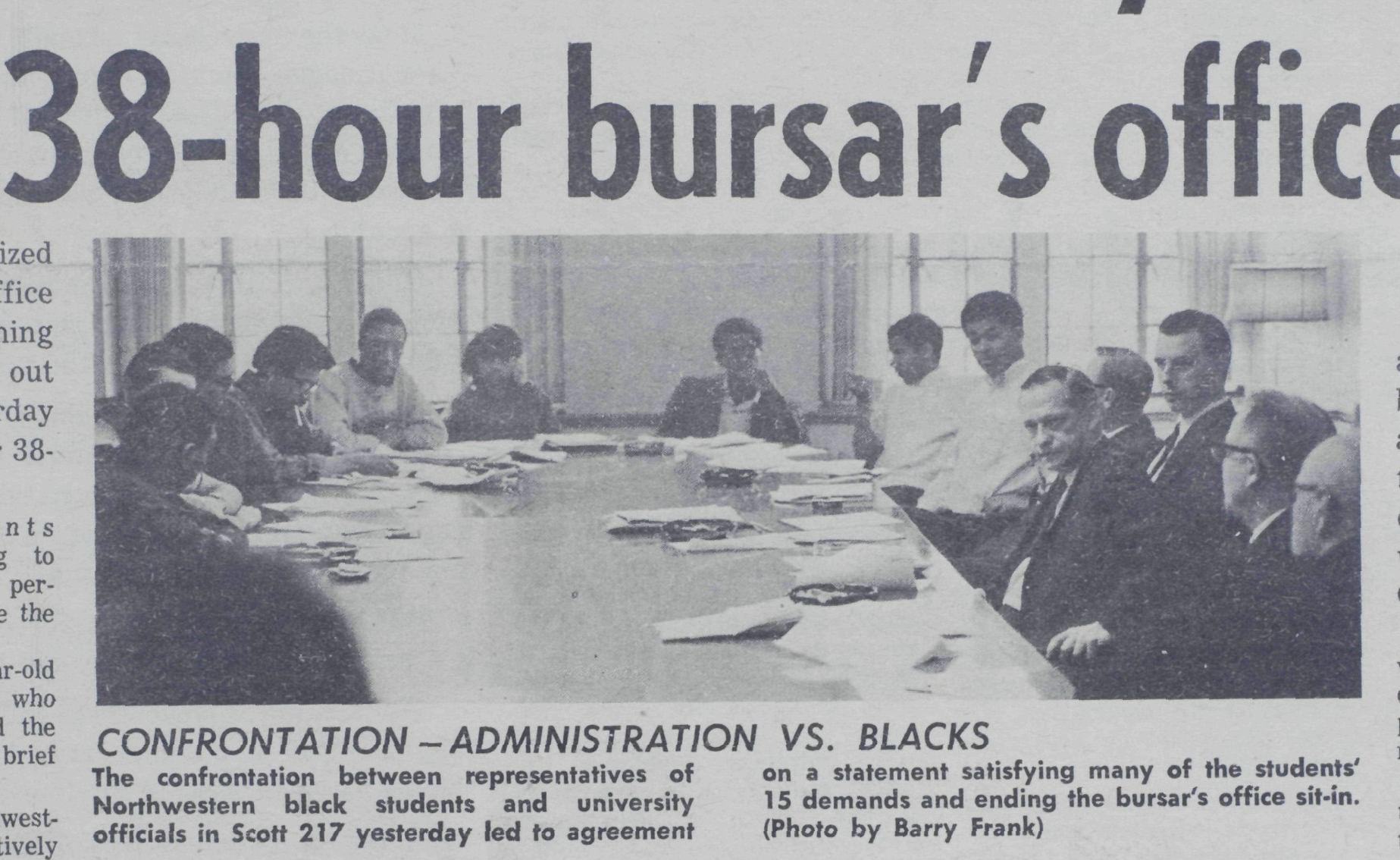
Representatives of FMO and AASU meet with members of the administration to discuss the terms of the “May 4th Agreement.”
On Saturday, May 4, 1968, at 9:00 am, representatives of FMO and AASU and Northwestern administration met in Scott 217 to negotiate an agreement to end the takeover of the Bursar’s Office. James Turner, Kathryn Ogletree, Amassa Fauntleroy, John Bracey, Victor Goode, Vernon Ford, Roger Ward, Michael Smith, Harold Daniels, and Arnold Wright were FMO and AASU representatives present at the negotiation. Payson Wild, Franklin Kreml, Robert Strotz, William Ihlanfeldt, Joe Park, Lucius Gregg, Gail Inlow, Robert Baker, Walter Wallace, and Roland Hinz were the Northwestern administration and faculty present. By 5 pm, these representatives collectively finalized the terms of what is referred to today as the “May 4th Agreement.” The compromise included establishing several advisory boards comprised of FMO members and administrators to advise and support efforts to improve admissions, financial aid, and open housing. The University also agreed to set aside living units for Black students, allocate a space on campus for a Black student union, and expand the curriculum to include African American Studies.
Evolution of the Demands to the May 4th Agreement
|
Demand |
Demands, April 22 | Demands, April 26 | May 4th Agreement |
| Policy Statement |
A Northwestern University official present an official statement acknowledging the existence of institutional racism at the University, and denouncing future tolerance of racism
|
President Miller issue a public statement of zero tolerance of racism at Northwestern University Restructure the University Disciplinary Committee (UDC), or create a new judiciary board to address racial incidents Retroactively apply this practice to the April 15 decision regarding Sigma Chi Fraternity Black students approve all appointments to the Human Relations Committee, or at least 50%
|
Granted: The administration will issue an official announcement deploring racism Establish an advisory council consisting of 10 Black students, chosen by the University from a list of 20 nominees presented by Black students; they will consult the University on approaches to being more responsive to the needs of black students, recommend changes in university procedures, support in the selection of University committee on Human Relations; these are salaried positions Not granted: Black students approve all appointments to the Human Relations Committee, or at least 50% |
| Admissions |
Guarantee the gradual increase of Black students to Northwestern, at least 12% Create a project to recruit Black students to campus Include Black students (of their own choosing) to advise on the steering committee for admissions At least 50% of incoming Black students come from inner city schools The administration present a list of Black students enrolled at the University
|
Guarantee the gradual increase of Black students to Northwestern, 10-12% Provide incoming students with enough financial aid that attending is actually feasible Include Black students (of their own choosing) to advise on the steering committee for admissions; these should be salaried positions; these representatives have shared power with the Office of Admission and Financial Aid in making all decisions relevant to Black students, including Black students admitted At least 50% of incoming Black students come from inner city schools The administration present a list of all Black students enrolled at the University and incoming students, with contact information to FMO Arrange a meeting between FMO and incoming Black students
|
Granted: Appoint a committee of Black students to assist the Admission Office in recruiting Black students to campus; salaried positions Seek to enroll 50% of Black students from inner cities, but not a guarantee Provide FMO with a list of the names and contact information of Black students Allocate funds for Black students to organize an orientation for incoming Black students Not Granted: Assuring that at least 10-12% of Black students are represented in each incoming class Giving student representatives shared power with the Office of Admission and Financial Aid in making all decisions relevant to Black students, including Black students admitted
|
| Financial Aid |
Increase scholarships for students to supplement the need for work-study Offer financial aid for summer school |
Offer special consideration for increasing financial aid for Black students Include Black students (of their own choosing) to advise on the steering committee for financial aid Eliminate student loans and work-study; replace them with scholarships
|
Granted: Appoint a committee of Black students and faculty to advise the Financial Aid Office on policy matters regarding financial aid to Black students Provide financial aid for the summer session |
| Housing |
Provide living units for Black students who want to live together by fall 1968
|
Provide living units for Black students who want to live together by fall 1968; or get rid of fraternity/sorority houses
|
Granted: Reserve a separate living unit for Black students
|
| Curriculum |
Offer Black Studies courses and hire Black professors
|
Immediately offer Black Studies courses and hire Black professors Create a visiting professor chair of Black Studies; allow Black students to select this individual each year |
Granted: Add Black Studies courses to the curriculum Follow-up procedures go through the Dean of the College of Arts and Sciences; they will recommend degree requirements Black students are asked to recommend specific courses and potential faculty Not granted: Black students to select faculty of Black Studies
|
| Counseling | Hire a Black counselor, someone who can relate to Black students and help them cope with stressors associated with being on a predominately white campus |
The University had already hired a counselor, but not of the student’s choosing Going forward, Black students must approve the hiring of a counselor
|
Granted: Allow Black students to approve of personnel hired as counselors of Black students |
| Student Union |
Allocate space on campus for Black students to have for social and recreational purposes It will serve as a space for the student organization For Members Only (FMO)
|
This demand was granted |
Granted: Provide a space on campus for a Black student union |
| Open Occupancy | Students recognize that the University supports open housing; they want the University to present evidence of this to the president of FMO to verify that their stand is genuine |
Students want the University to demonstrate greater involvement in upholding the Evanston Open Occupancy Law Students want to be part of the committee reviewing the study of open housing in Evanston |
Granted: Allow Black students to participate in open housing review committees and to work with the administration on new housing policies for the University |
Announcements of the "May 4th Agreement"
At 8:00 pm, Dean Hinz announced to the press that the administration and members of FMO and AASU had reached an agreement. He also made an official statement on the issue of institutional racism: “we cannot be complacent with institutional arrangements that ignore the special problems of black students. An important and difficult problem is that of an essentially white leadership coming to understand the special needs and feelings of the black students, as well as the difficulty arising because the black student does not regard the white university authorities as capable of appreciating all of the nuances of his decidedly separate culture.”
Dean Hinz and other administrators inspected the Bursar’s Office following the announcement. They did not find evidence of destruction in the building, an issue students were sensitive to while they occupied the building. The remaining Black students left the building by 9:30 pm, which officially ended the 38-hour demonstration. Northwestern students celebrated the conclusion of the Takeover with members of FMO and AASU. Some broke out singing the Black national anthem, “Lift Every Voice and Sing,” and the popular civil rights song, “Let Your Little Light Shine.”
James Turner also made a statement to the press:
“The situation at Northwestern University has been positively resolved. To this extent it is to the benefit of all concerned and to the general community. The difference between this situation and the one at Columbia was due to the enlightened manner in which the administration conducted its response. They displayed themselves as men not only of responsibility but with a willingness to listen and learn.” On May 9, 1968, Turner spoke at Northwestern University’s Student Symposium 1969, on the topic of “Black Students: After the Crisis.” The event was broadcasted on Northwestern’s student radio station WNUR. Audio clips from Turner’s talk are featured below:
|
Turner discusses the work ahead to implement the “May 4th Agreement.” He also responds to backlash and criticisms of the Takeover (00:06:57). |
Turner outlines the reasons students organized the Takeover, particularly addressing issues of social alienation and the importance of Black students having their own spaces on campus (00:06:14). |
Turner discusses the problems of advocating for a color blindness approach for correcting racism (00:05:44). |
Reaction
While the administration and Black students came to a peaceful and agreeable resolution, the actions of Black students received mixed responses from the press, students, faculty, alumni, trustees, and administrators. The press had a presence during the 38-hour demonstration. Some papers presented the Takeover and resolution in a balanced fashion, such as the Chicago Daily News and Chicago Sun Times. Others, namely the Chicago Tribune, referred to the Takeover as a “chitlin revolution,” evoking a racial stereotype. The Chicago Tribune further asserted that Northwestern University administrators “gave in” to Black student demands. The article offended many of the faculty members although most of the faculty did not initially support the Takeover; they responded to this article by sending letters to the editor of the newspaper praising the University’s response to the Takeover. In fact, following the announcement of the May 4th Agreement, 425 out of 734 full-time faculty approved of the outcome.
While President Miller did not support the tactics of the Takeover, he issued a statement recognizing the challenges of Black students on a predominately white campus, admitting that the university “failed to understand the depth of the problems presented by prior petitions.” However, the Board of Trustees needed more convincing that the May 4th Agreement was the best approach for ending the Takeover as they appointed a sub-committee to investigate the demonstration. Some faculty members were disappointed in the Board’s reluctance to immediately accept the May 4th Agreement and wrote letters insisting they would resign if the Board did not support the settlement. On May 12, 1968, the Board of Trustees drafted a resolution agreeing that the May 4th Agreement was satisfactory and gave approval to the administration to move forward with implementing the document. Still, they condemned the unlawful tactics of the Takeover and the disruption to normal campus operations. The administration was urged to put measures in place to prevent and discourage similar incidents in the future.
Like President Miller and the Board of Trustees, the Alumni Board did not approve of the tactics of the Takeover. However, on May 7, 1968, Howard Rosenheim, Northwestern University Alumni Association President, issued a statement supporting the University’s actions stating, “The students on campuses today are challenging the values and standards of our society as never before. In some cases, they are employing extreme methods to gain their ends. When the dust is settled and we look to the deeper meaning of the actions at Northwestern, I believe we will find a source of pride and hope for the future.” Individual alumni were even more divided and vocalized their displeasure and support by sending letters to the Alumni Relations Office. By September 1968, the office received about 900 letters, 225 letters in support and 615 disagreeing with the University’s action.
Implementation
The University and Black students began to strategize the best approaches to implementing the May 4th Agreement as early as a few days after the Takeover. Some aspects of the agreement were addressed quickly, such as providing a list of the names of Black students enrolled at Northwestern to FMO. Other issues required longer periods of time, and in some cases brought about disagreements between students and the administration concerning the approach and timetable for meeting them. Nevertheless, there was a commitment on both sides to implement the agreement. Since the agreement included Black students serving on advisory boards, FMO membership decided to restructure its leadership to better adhere to those duties. This in effect gave the organization structure it did not have prior to the Takeover; they established a Governor of Campus Affairs, Correlator of Communications, and Minister of Communal Affairs.
Another part of the agreement was to designate a space for a Black student union. The administration identified 619 Emerson Street as this space. Students would name it the Black House. However, students urged the administration to relocate the Black House to a different building that offered more space and amenities. By 1973, The Black House moved caddy-corner to 1914 Sheridan Road. This three-floor building served as the headquarters of For Members Only (FMO), Black fraternities and sororities, housed the Garvey-Shabazz Library, which included collections of tapes, films, and books about Black history and culture, and the Paul Robeson Conference Room. Student-made artwork, murals, and works by prominent Chicago-area figures such as Margaret T. Burroughs were also introduced to this social gathering spot. In 1971, The Department of Minority Affairs later called the Department of African American Student Affairs (AASA), served as the administrative unit for Black student affairs. They offered programs in the areas of academic counseling, career advising, personal counseling, cultural events, and student organization advising.
A motion was passed on March 6, 1969, to add Afro-American Studies, later called African American Studies, to the College of Arts and Sciences. The department was officially established in 1972. The first courses included Afro-American History and Culture, History of Afro-American Thought on Africa, and History of Black Nationalism in America. Students advocated for Lerone Bennett, editor of Ebony and Jet magazines, hiring to the department. He served briefly as the first chair of the department.
Legacy
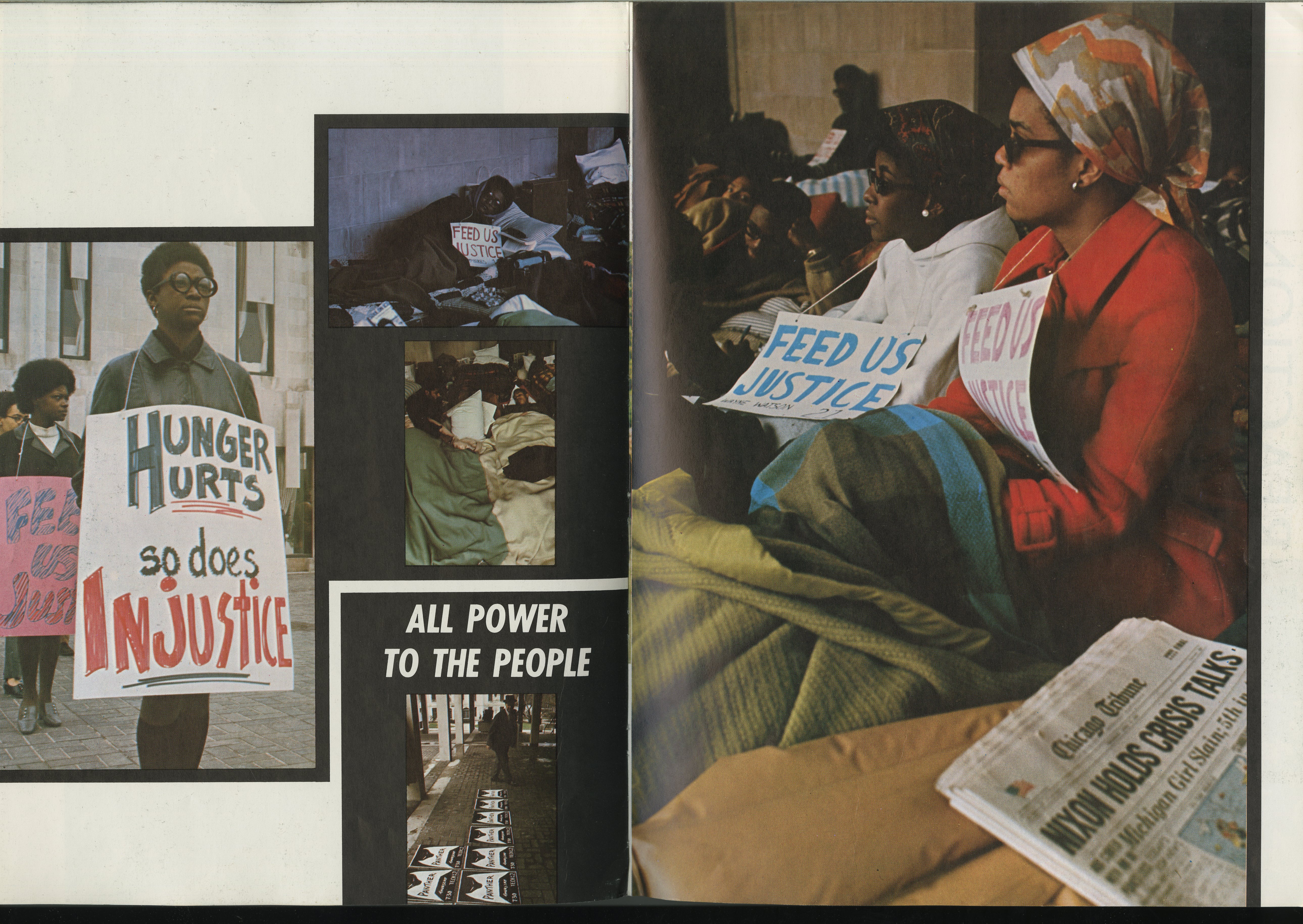
Hunger strike demonstration in front of the Rebecca Crown Center, 1969 Photo courtesy of Syllabus 1970
The Takeover demonstrated to Black students that they had collective power to bring about effective change on campus. They organized a protest the following year in regards to the Triangle Fraternity incident. Twenty-one Black students were charged with illegally entering the Triangle Fraternity House in search of a fraternity member they accused of assaulting a Black female student. This resulted in a fight between the Black students who entered the building and members of the fraternity. The May 4th Agreement was tested as Black students questioned the outcome of the University Discipline Committee’s (UDC) decision to charge 21 Black students with restitution for damages and suspension for the academic year. Some of these students included Takeover activists. Northwestern students staged a hunger strike and held a protest on Rebecca Crown Plaza. This, however, did not lead the UDC to overturn the charges.
The Takeover, however, has had a lasting impact at Northwestern University. The recruitment of Black students proved to be effective when in the early years following the Takeover enrollment of Black students grew to 650 in 1973, accounting for 10% of the undergraduate student body that academic year. The University has since conducted periodic reviews of the Black experience, which included surveys meant to track the progress and needs of the Black student population. The historic significance of the Takeover has not been forgotten by students and staff alike. In 1969, FMO initiated the tradition “The Ritual,” retelling the story of the Takeover by having incoming students reenact events from the Takeover at Black student orientation. The history has also been recorded in FMO’s student handbooks and in articles in Blackboard magazine. FMO has also held annual ceremonies commemorating Takeover anniversaries, extending the celebration into “Indestructible Black Consciousness Week.”
Some students have credited the Takeover as their inspiration for future campus protests. For example, in 1986 students held a demonstration in front of the CAS to demand a stronger commitment to building the African American Studies Department. In 1995 students led a hunger strike to compel the University to establish an Asian American Studies Department. And in 2015, students presented a list of demands to the University regarding issues and experiences of marginalization on campus in relation to student spaces, academics, faculty & staff, student safety, and ethics.
The impact of the Takeover lives on to this day, and its legacy will not be forgotten.
Sources
Visit the Bibliography page for sources consulted in this essay. Interviews were also conducted with the following Northwestern University alumni, Clovis Semmes, Herman Cage, Kathryn Ogletree, Leslie Harris, Jean Semmes, and James Pitts.

